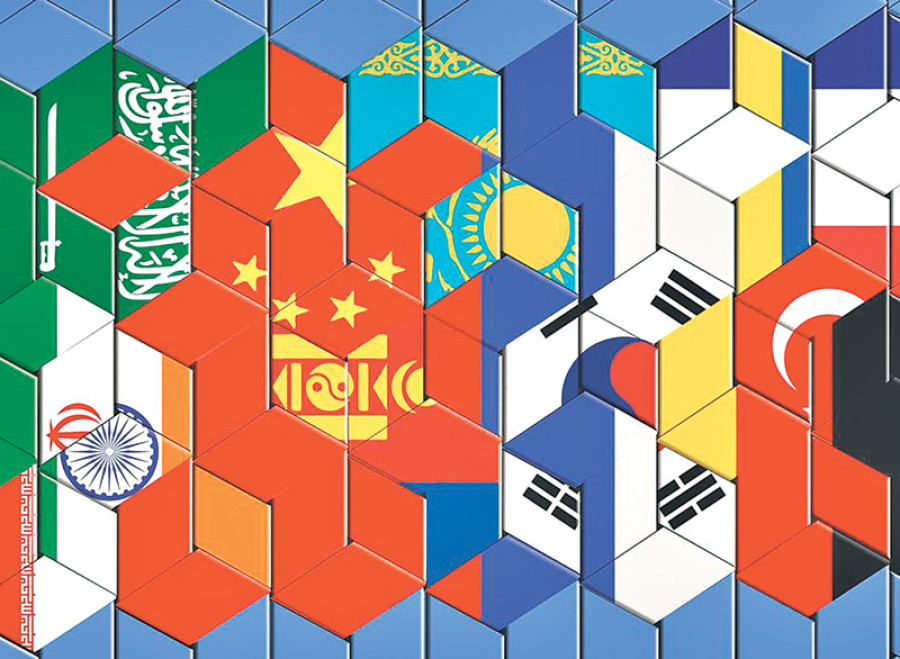Opinion
Not smooth as silk
Nepal and China signed a memorandum of understanding on the One Belt One Road (OBOR) Initiative in Kathmandu on May 12.
Nepal and China signed a memorandum of understanding on the One Belt One Road (OBOR) Initiative in Kathmandu on May 12. Deputy Prime Minister and Finance Minister Krishna Bahadur Mahara of the CPN (Maoist Centre) represented Nepal at the OBOR conference held in Beijing. Nepal plays a key role in connecting the OBOR with India as Kyirong in western Tibet is situated close to Nepal’s border at Rasuwa. This route has replaced the highway linking Kathmandu and the border point of Kodari in the northeast which was constructed in the 1960s during the time of king Mahendra.
Unwilling participants
The Chinese have prioritised Rasuwa in the northwest of Kathmandu as the entry point after the devastating earthquake in 2015. The 27-km Kyirong-Rasuwa road is being constructed as a two-lane highway. Kyirong is being developed as the main point connecting South Asia and China. The Chinese also constructed a road linking Naubise in the west of Kathmandu with Pokhara in the 1970s, and another link road from Mugling on this road to Narayanghat in the Chitwan Valley in the Inner Tarai. This has now become one of the most important link roads between Kathmandu and the southern plains. The road from Rasuwa to Galchhi and Narayanghat and further south to the Indian border will be the shortest road linking Tibet with the Gangetic Plain.
The western part of China is relatively underdeveloped compared to the coast in the east. When Xi Jinping became president of China in 2013, he proposed a Belt and Road Initiative to increase connectivity between China and South Asia and China and Europe. India has been unwilling to participate in the OBOR Initiative while China is interested in getting India involved. Last August, a seminar on China, Nepal and India concerning the economic corridor and its feasibility was held in Kathmandu. It was organised by the China Study Centre, a Chinese think tank China Institute of Contemporary International Relations and the Nepal Council of World Affairs.
The Indian ambassador in Kathmandu Ranjit Ray had been invited, but he didn’t show up. There was no one from the Indian Embassy while the US Embassy sent a second secretary. India officially declined China’s invitation to participate in the OBOR conference in Beijing this month saying that part of OBOR passes through Pakistani occupied territory in Gilgit and Baltistan in Kashmir. The summit in Beijing was attended by many heads of state or government including all South Asian countries except India and Bhutan. The China-Pakistan Economic Corridor (CPEC) passes from Kashgar in Xinjiang, China to the port of Gwadar in Baluchistan on the Arabian Sea. This route has great strategic importance as it can be used to transport oil from the Gulf to western China and send exports from eastern China to the port of Gwadar.
Question of sovereignty
According to well-known Indian columnist Raja Mohan, OBOR will “massively strengthen China’s neighbourhood and marginalise Delhi’s regional primacy”. India’s Finance Minister Arun Jaitley has said that India has “serious reservations” about the issue of sovereignty on the OBOR Initiative. The question about how India’s non-participation will affect Nepal is also bound to be raised. The Kyirong-Galchhi-Mugling-Narayanghat road has been proposed as the best route for Sino-Indian commerce. It envisages connecting China with the densely populated Gangetic Plain in India. India’s participation in OBOR is essential for this to succeed.
On the other hand, the BCIM Corridor (Bangladesh, China, India and Myanmar) may be more to India’s liking as it will not affect the question of sovereignty like the CPEC between India and Pakistan. Ashok Malik has written in The Pioneer, an Indian daily, that the end goal of OBOR is “to establish Chinese mastery over oceans and connectivity routes across Asia and between Asia and Europe”.
In answer to the question of whether OBOR minus CPEC would be acceptable to India, he said that not only was CPEC unacceptable, but “the very foundational principles of OBOR offer a strategic challenge to India”. However, India may be amenable to the prospect of the BCIM Corridor as, unlike in the case of India-claimed parts of Kashmir in CPEC, questions of sovereignty will be avoided. Gilgit and part of the Karakoram Highway located in Pakistan are also claimed by India.
A win-win situation for China, India and Nepal under OBOR would have benefitted all three countries, but that doesn’t seem possible now. India’s influence in Nepal started eroding under the United Progressive Alliance-1 government when it brokered the 12-Point Accord between the Maoists and the seven political parties in 2005. The pact was signed in Delhi, indicating Indian interference in Nepal’s internal affairs.
Another instance of Indian interference was evident in the reluctance shown by the Modi administration in welcoming Nepal’s constitution promulgated by an elected Constituent Assembly in September 2015. The Modi administration maintained that the constitution was not inclusive. This was followed by a five-month-long ‘undeclared blockade’. Indian columnist Raja Mohan suggests that the “full resources of Indian state need to be mobilised to purposefully address the long-term opportunities and challenges” presented by China’s OBOR by debating specific terms of individual projects “rather than having to say ‘yes’ or ‘no’ to OBOR as a whole.”
Raj is a former staff member of the United Nations Secretariat and a former vice-president of the Nepal Council of World Affairs




 14.24°C Kathmandu
14.24°C Kathmandu










